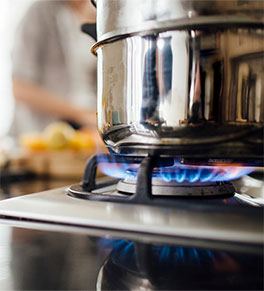The potential health threat of using gas stoves

Spending a few minutes near a gas stove won’t significantly raise your health risk, but if you already suffer from asthma or other respiratory health issues, reducing exposure is key, says UCI Health pulmonologist Dr. Huawei Dong.
Gas stoves, a staple in millions of homes, may pose risks to children and people with respiratory issues, a UCI Health expert warns.
“A gas burner may indirectly pose more of a threat than an electric stove top, due to the byproducts that are released into the air as methane gas burns while you cook; namely, nitrogen dioxide, which has been linked to respiratory issues as well as cardiovascular risks,” UCI Health pulmonologist Dr. Huawei Dong told Good Housekeeping in an article about the growing debate over gas stoves and the health risks of using gas-burning stoves in the home.
“When we breathe that in, it causes irritation and local inflammation in the bronchial tubes and the airways, which you may not even notice if you've never experienced prior respiratory issues like asthma," she said.
"One of the key things that happens in asthma patients, whether you're a child or an adult, is that the airways become inflamed and they become narrower, causing things like wheezing and shortness of breath.”
Asthma risk for children
The Good Housekeeping article referenced a recent study published in the International Journal of Environmental Research and Public Health, which links the use of gas stoves in home kitchens to an increased risk of asthma among children.
Because of that research and concerns about global warming, the U.S. Consumer Product Safety Commission chairman recently said the agency plans to consider ways to curb emissions from household gas stoves.
“Most asthma cases, including those in children, are considered ‘multifactorial’ by doctors who treat them,” said Dong, an assistant professor of pulmonary diseases and critical care at the UCI School of Medicine.
“Some of the risk for asthma certainly may come down to what we're exposed to in the home, as well as where we live and the outdoor environments where we spend time due to air pollution," she says. "We've known that for decades in seeing the development of worse asthma and lung disease — but most of that effect is cumulative over time.”
Spending a few minutes near a gas stove won’t significantly increase your asthma risk, but health experts are concerned about long-term exposure and how they may exacerbate breathing issues for someone who already suffers from asthma or other respiratory health issues.
For those people, Dong says reducing exposure is key.
How to lower your risk
Despite the recent concerns about gas stoves, it’s important to remember there are simple solutions that can reduce your health risk.
When using your gas stove, experts suggest:
- Ventilating the kitchen when cooking. Open a window/door or turn on a fan.
- Running the stove’s exhaust fan each time you cook.
- Using the stove less frequently. Instead, cook with a microwave or boil water with an electric kettle.
- Getting/using an air purifier with a HEPA filter.




